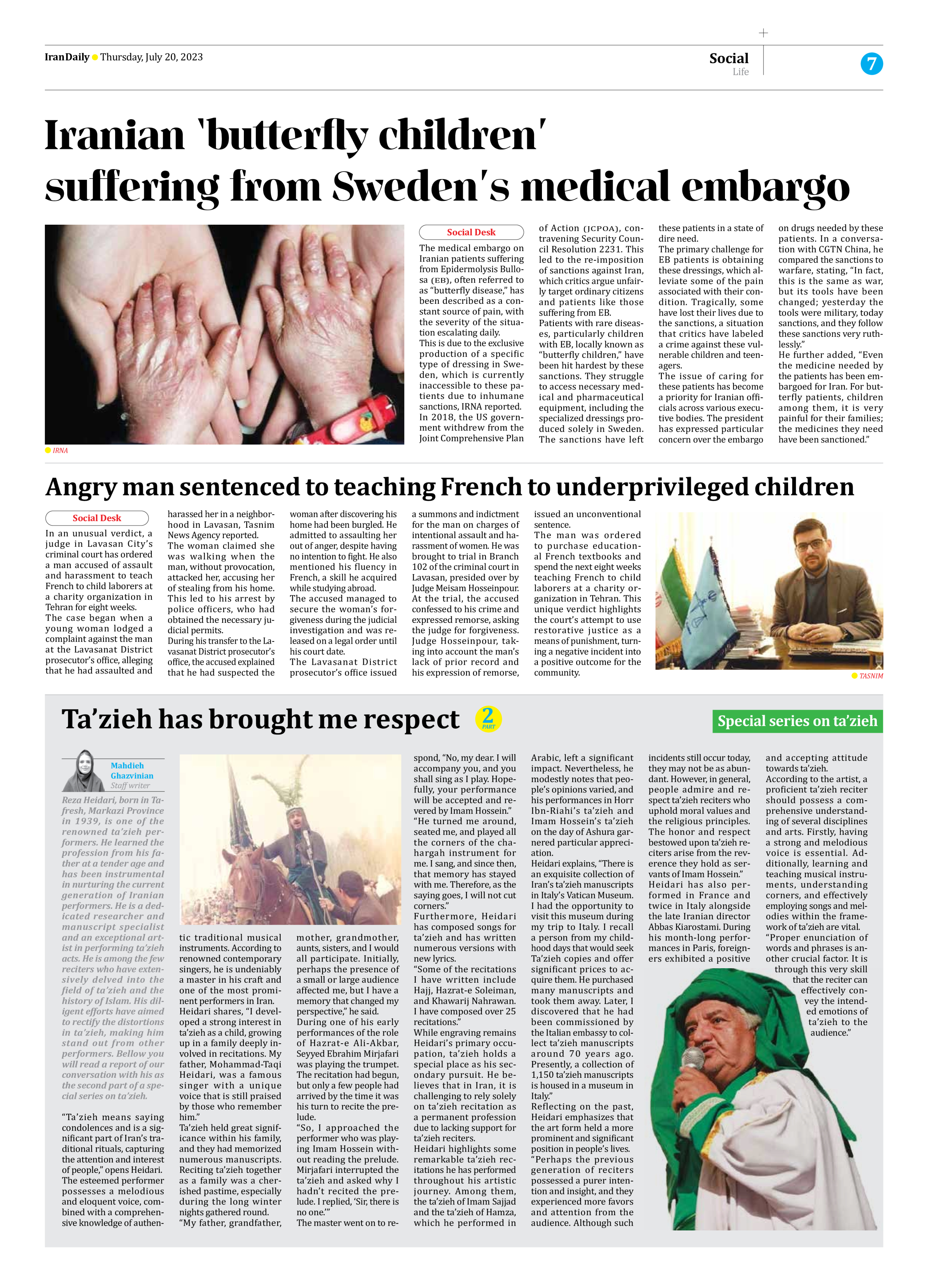
Ta’zieh has brought me respect
Mahdieh Ghazvinian
Staff writer
Reza Heidari, born in Tafresh, Markazi Province in 1939, is one of the renowned ta’zieh performers. He learned the profession from his father at a tender age and has been instrumental in nurturing the current generation of Iranian performers. He is a dedicated researcher and manuscript specialist and an exceptional artist in performing ta’zieh acts. He is among the few reciters who have extensively delved into the field of ta’zieh and the history of Islam. His diligent efforts have aimed to rectify the distortions in ta’zieh, making him stand out from other performers. Bellow you will read a report of our conversation with his as the second part of a special series on ta’zieh.
“Ta’zieh means saying condolences and is a significant part of Iran’s traditional rituals, capturing the attention and interest of people,” opens Heidari.
The esteemed performer possesses a melodious and eloquent voice, combined with a comprehensive knowledge of authentic traditional musical instruments. According to renowned contemporary singers, he is undeniably a master in his craft and one of the most prominent performers in Iran.
Heidari shares, “I developed a strong interest in ta’zieh as a child, growing up in a family deeply involved in recitations. My father, Mohammad-Taqi Heidari, was a famous singer with a unique voice that is still praised by those who remember him.”
Ta’zieh held great significance within his family, and they had memorized numerous manuscripts. Reciting ta’zieh together as a family was a cherished pastime, especially during the long winter nights gathered round.
“My father, grandfather, mother, grandmother, aunts, sisters, and I would all participate. Initially, perhaps the presence of a small or large audience affected me, but I have a memory that changed my perspective,” he said.
During one of his early performances of the role of Hazrat-e Ali-Akbar, Seyyed Ebrahim Mirjafari was playing the trumpet. The recitation had begun, but only a few people had arrived by the time it was his turn to recite the prelude.
“So, I approached the performer who was playing Imam Hossein without reading the prelude. Mirjafari interrupted the ta’zieh and asked why I hadn’t recited the prelude. I replied, ‘Sir, there is no one.’”
The master went on to respond, “No, my dear. I will accompany you, and you shall sing as I play. Hopefully, your performance will be accepted and revered by Imam Hossein.”
“He turned me around, seated me, and played all the corners of the chahargah instrument for me. I sang, and since then, that memory has stayed with me. Therefore, as the saying goes, I will not cut corners.”
Furthermore, Heidari has composed songs for ta’zieh and has written numerous versions with new lyrics.
“Some of the recitations I have written include Hajj, Hazrat-e Soleiman, and Khawarij Nahrawan. I have composed over 25 recitations.”
While engraving remains Heidari’s primary occupation, ta’zieh holds a special place as his secondary pursuit. He believes that in Iran, it is challenging to rely solely on ta’zieh recitation as a permanent profession due to lacking support for ta’zieh reciters.
Heidari highlights some remarkable ta’zieh recitations he has performed throughout his artistic journey. Among them, the ta’zieh of Imam Sajjad and the ta’zieh of Hamza, which he performed in Arabic, left a significant impact. Nevertheless, he modestly notes that people’s opinions varied, and his performances in Horr Ibn-Riahi’s ta’zieh and Imam Hossein’s ta’zieh on the day of Ashura garnered particular appreciation.
Heidari explains, “There is an exquisite collection of Iran’s ta’zieh manuscripts in Italy’s Vatican Museum. I had the opportunity to visit this museum during my trip to Italy. I recall a person from my childhood days that would seek Ta’zieh copies and offer significant prices to acquire them. He purchased many manuscripts and took them away. Later, I discovered that he had been commissioned by the Italian embassy to collect ta’zieh manuscripts around 70 years ago. Presently, a collection of 1,150 ta’zieh manuscripts is housed in a museum in Italy.”
Reflecting on the past, Heidari emphasizes that the art form held a more prominent and significant position in people’s lives.
“Perhaps the previous generation of reciters possessed a purer intention and insight, and they experienced more favors and attention from the audience. Although such incidents still occur today, they may not be as abundant. However, in general, people admire and respect ta’zieh reciters who uphold moral values and the religious principles. The honor and respect bestowed upon ta’zieh reciters arise from the reverence they hold as servants of Imam Hossein.”
Heidari has also performed in France and twice in Italy alongside the late Iranian director Abbas Kiarostami. During his month-long performances in Paris, foreigners exhibited a positive and accepting attitude towards ta’zieh.
According to the artist, a proficient ta’zieh reciter should possess a comprehensive understanding of several disciplines and arts. Firstly, having a strong and melodious voice is essential. Additionally, learning and teaching musical instruments, understanding corners, and effectively employing songs and melodies within the framework of ta’zieh are vital.
“Proper enunciation of words and phrases is another crucial factor. It is through this very skill that the reciter can effectively convey the intended emotions of ta’zieh to the audience.”







